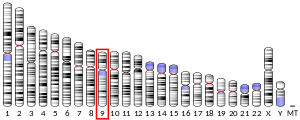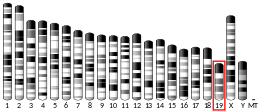Proprotein convertase subtilisin/kexin type 5 is an enzyme that in humans is encoded by the PCSK5 gene, found in chromosome 9q21.3[5][6][7] Two alternatively spliced transcripts are described for this gene but only one has its full length nature known.
Function
editThe protein encoded by this gene belongs to the subtilisin-like proprotein convertase family. The members of this family are proprotein convertases that process latent precursor proteins into their biologically active products. This encoded protein mediates posttranslational endoproteolytic processing for several integrin alpha subunits. It is thought to process prorenin, pro-membrane type-1 matrix metalloproteinase and HIV-1 glycoprotein gp160.[7]
Clinical significance
editMutations in this gene have been associated with Currarino syndrome-like malformations.[8]
PCSK5 expression has been linked to higher survival rates for lung cancer patients.[9]
References
edit- ^ a b c GRCh38: Ensembl release 89: ENSG00000099139 – Ensembl, May 2017
- ^ a b c GRCm38: Ensembl release 89: ENSMUSG00000024713 – Ensembl, May 2017
- ^ "Human PubMed Reference:". National Center for Biotechnology Information, U.S. National Library of Medicine.
- ^ "Mouse PubMed Reference:". National Center for Biotechnology Information, U.S. National Library of Medicine.
- ^ van de Loo JW, Creemers JW, Kas K, Roebroek AJ, Van de Ven WJ (1996). "Assignment of the human proprotein convertase gene PCSK5 to chromosome 9q21.3". Cytogenetic and Genome Research. 75 (4): 227–229. doi:10.1159/000134489. PMID 9067430.
- ^ Mbikay M, Seidah NG, Chrétien M, Simpson EM (Jul 1995). "Chromosomal assignment of the genes for proprotein convertases PC4, PC5, and PACE 4 in mouse and human". Genomics. 26 (1): 123–9. doi:10.1016/0888-7543(95)80090-9. PMID 7782070.
- ^ a b "Entrez Gene: PCSK5 proprotein convertase subtilisin/kexin type 5".
- ^ Szumska D, Pieles G, Essalmani R, Bilski M, Mesnard D, Kaur K, Franklyn A, El Omari K, Jefferis J, Bentham J, Taylor JM, Schneider JE, Arnold SJ, Johnson P, Tymowska-Lalanne Z, Stammers D, Clarke K, Neubauer S, Morris A, Brown SD, Shaw-Smith C, Cama A, Capra V, Ragoussis J, Constam D, Seidah NG, Prat A, Bhattacharya S (June 2008). "VACTERL/caudal regression/Currarino syndrome-like malformations in mice with mutation in the proprotein convertase Pcsk5". Genes Dev. 22 (11): 1465–77. doi:10.1101/gad.479408. PMC 2418583. PMID 18519639.
- ^ "Research update from the MCM team (January 2024)". World Community Grid. 16 January 2024. Retrieved 21 May 2024.
Further reading
edit- Bassi DE, Mahloogi H, Klein-Szanto AJ (2000). "The proprotein convertases furin and PACE4 play a significant role in tumor progression". Mol. Carcinog. 28 (2): 63–9. doi:10.1002/1098-2744(200006)28:2<63::AID-MC1>3.0.CO;2-C. PMID 10900462. S2CID 22849623.
- Moulard M, Decroly E (2001). "Maturation of HIV envelope glycoprotein precursors by cellular endoproteases". Biochim. Biophys. Acta. 1469 (3): 121–32. doi:10.1016/S0304-4157(00)00014-9. PMID 11063880.
- Maruyama K, Sugano S (1994). "Oligo-capping: a simple method to replace the cap structure of eukaryotic mRNAs with oligoribonucleotides". Gene. 138 (1–2): 171–4. doi:10.1016/0378-1119(94)90802-8. PMID 8125298.
- Campan M, Yoshizumi M, Seidah NG, Lee ME, Bianchi C, Haber E (1996). "Increased proteolytic processing of protein tyrosine phosphatase mu in confluent vascular endothelial cells: the role of PC5, a member of the subtilisin family". Biochemistry. 35 (12): 3797–802. doi:10.1021/bi952552d. PMID 8620001.
- Vollenweider F, Benjannet S, Decroly E, Savaria D, Lazure C, Thomas G, Chrétien M, Seidah NG (1996). "Comparative cellular processing of the human immunodeficiency virus (HIV-1) envelope glycoprotein gp160 by the mammalian subtilisin/kexin-like convertases". Biochem. J. 314 (Pt 2): 521–32. doi:10.1042/bj3140521. PMC 1217081. PMID 8670066.
- Miranda L, Wolf J, Pichuantes S, Duke R, Franzusoff A (1996). "Isolation of the human PC6 gene encoding the putative host protease for HIV-1 gp160 processing in CD4+ T lymphocytes". Proc. Natl. Acad. Sci. U.S.A. 93 (15): 7695–700. Bibcode:1996PNAS...93.7695M. doi:10.1073/pnas.93.15.7695. PMC 38809. PMID 8755538.
- Nachtigal MW, Ingraham HA (1996). "Bioactivation of Müllerian inhibiting substance during gonadal development by a kex2/subtilisin-like endoprotease". Proc. Natl. Acad. Sci. U.S.A. 93 (15): 7711–6. Bibcode:1996PNAS...93.7711N. doi:10.1073/pnas.93.15.7711. PMC 38812. PMID 8755541.
- Mercure C, Jutras I, Day R, Seidah NG, Reudelhuber TL (1996). "Prohormone convertase PC5 is a candidate processing enzyme for prorenin in the human adrenal cortex". Hypertension. 28 (5): 840–6. doi:10.1161/01.hyp.28.5.840. PMID 8901832.
- De Bie I, Marcinkiewicz M, Malide D, Lazure C, Nakayama K, Bendayan M, Seidah NG (1997). "The isoforms of proprotein convertase PC5 are sorted to different subcellular compartments". J. Cell Biol. 135 (5): 1261–75. doi:10.1083/jcb.135.5.1261. PMC 2121096. PMID 8947550.
- van de Loo JW, Creemers JW, Kas K, Roebroek AJ, Van de Ven WJ (1997). "Assignment of the human proprotein convertase gene PCSK5 to chromosome 9q21.3". Cytogenet. Cell Genet. 75 (4): 227–9. doi:10.1159/000134489. PMID 9067430.
- Suzuki Y, Yoshitomo-Nakagawa K, Maruyama K, Suyama A, Sugano S (1997). "Construction and characterization of a full length-enriched and a 5'-end-enriched cDNA library". Gene. 200 (1–2): 149–56. doi:10.1016/S0378-1119(97)00411-3. PMID 9373149.
- Moulard M, Chaloin L, Canarelli S, Mabrouk K, Darbon H, Challoin L (1998). "Retroviral envelope glycoprotein processing: structural investigation of the cleavage site". Biochemistry. 37 (13): 4510–7. doi:10.1021/bi972662f. PMID 9521771.
- Lissitzky JC, Luis J, Munzer JS, Benjannet S, Parat F, Chrétien M, Marvaldi J, Seidah NG (2000). "Endoproteolytic processing of integrin pro-alpha subunits involves the redundant function of furin and proprotein convertase (PC) 5A, but not paired basic amino acid converting enzyme (PACE) 4, PC5B or PC7". Biochem. J. 346 Pt 1 (Pt 1): 133–8. doi:10.1042/0264-6021:3460133. PMC 1220832. PMID 10657249.
- Yana I, Weiss SJ (2000). "Regulation of Membrane Type-1 Matrix Metalloproteinase Activation by Proprotein Convertases". Mol. Biol. Cell. 11 (7): 2387–401. doi:10.1091/mbc.11.7.2387. PMC 14927. PMID 10888676.
- Hartley JL, Temple GF, Brasch MA (2001). "DNA Cloning Using In Vitro Site-Specific Recombination". Genome Res. 10 (11): 1788–95. doi:10.1101/gr.143000. PMC 310948. PMID 11076863.
- Simpson JC, Wellenreuther R, Poustka A, Pepperkok R, Wiemann S (2001). "Systematic subcellular localization of novel proteins identified by large-scale cDNA sequencing". EMBO Rep. 1 (3): 287–92. doi:10.1093/embo-reports/kvd058. PMC 1083732. PMID 11256614.






